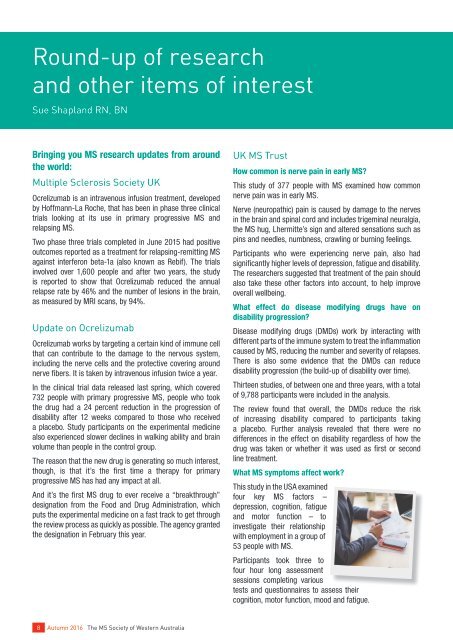Create successful ePaper yourself
Turn your PDF publications into a flip-book with our unique Google optimized e-Paper software.
Round-up of research<br />
and other items of interest<br />
Sue Shapland RN, BN<br />
Bringing you MS research updates from around<br />
the world:<br />
Multiple Sclerosis Society UK<br />
Ocrelizumab is an intravenous infusion treatment, developed<br />
by Hoffmann-La Roche, that has been in phase three clinical<br />
trials looking at its use in primary progressive MS and<br />
relapsing MS.<br />
Two phase three trials completed in June 2015 had positive<br />
outcomes reported as a treatment for relapsing-remitting MS<br />
against interferon beta-1a (also known as Rebif). The trials<br />
involved over 1,600 people and after two years, the study<br />
is reported to show that Ocrelizumab reduced the annual<br />
relapse rate by 46% and the number of lesions in the brain,<br />
as measured by MRI scans, by 94%.<br />
Update on Ocrelizumab<br />
Ocrelizumab works by targeting a certain kind of immune cell<br />
that can contribute to the damage to the nervous system,<br />
including the nerve cells and the protective covering around<br />
nerve fibers. It is taken by intravenous infusion twice a year.<br />
In the clinical trial data released last spring, which covered<br />
732 people with primary progressive MS, people who took<br />
the drug had a 24 percent reduction in the progression of<br />
disability after 12 weeks compared to those who received<br />
a placebo. Study participants on the experimental medicine<br />
also experienced slower declines in walking ability and brain<br />
volume than people in the control group.<br />
The reason that the new drug is generating so much interest,<br />
though, is that it’s the first time a therapy for primary<br />
progressive MS has had any impact at all.<br />
And it’s the first MS drug to ever receive a “breakthrough”<br />
designation from the Food and Drug Administration, which<br />
puts the experimental medicine on a fast track to get through<br />
the review process as quickly as possible. The agency granted<br />
the designation in February this year.<br />
UK MS Trust<br />
How common is nerve pain in early MS?<br />
This study of 377 people with MS examined how common<br />
nerve pain was in early MS.<br />
Nerve (neuropathic) pain is caused by damage to the nerves<br />
in the brain and spinal cord and includes trigeminal neuralgia,<br />
the MS hug, Lhermitte’s sign and altered sensations such as<br />
pins and needles, numbness, crawling or burning feelings.<br />
Participants who were experiencing nerve pain, also had<br />
significantly higher levels of depression, fatigue and disability.<br />
The researchers suggested that treatment of the pain should<br />
also take these other factors into account, to help improve<br />
overall wellbeing.<br />
What effect do disease modifying drugs have on<br />
disability progression?<br />
Disease modifying drugs (DMDs) work by interacting with<br />
different parts of the immune system to treat the inflammation<br />
caused by MS, reducing the number and severity of relapses.<br />
There is also some evidence that the DMDs can reduce<br />
disability progression (the build-up of disability over time).<br />
Thirteen studies, of between one and three years, with a total<br />
of 9,788 participants were included in the analysis.<br />
The review found that overall, the DMDs reduce the risk<br />
of increasing disability compared to participants taking<br />
a placebo. Further analysis revealed that there were no<br />
differences in the effect on disability regardless of how the<br />
drug was taken or whether it was used as first or second<br />
line treatment.<br />
What MS symptoms affect work?<br />
This study in the USA examined<br />
four key MS factors –<br />
depression, cognition, fatigue<br />
and motor function – to<br />
investigate their relationship<br />
with employment in a group of<br />
53 people with MS.<br />
Participants took three to<br />
four hour long assessment<br />
sessions completing various<br />
tests and questionnaires to assess their<br />
cognition, motor function, mood and fatigue.<br />
The study found that cognitive, motor function and fatigue<br />
test scores, as well as higher EDSS scores, were significantly<br />
related to unemployment.<br />
The researchers concluded that health professionals could<br />
support people with MS and help them to learn management<br />
techniques to deal with, or compensate for, fatigue and<br />
cognitive symptoms that could help them stay employed.<br />
Emotional changes in people with MS<br />
This French study looked<br />
at emotional changes in<br />
60 people with relapsingremitting<br />
MS (RRMS) and 41<br />
with primary progressive MS<br />
(PPMS). Each person with MS<br />
in the study was matched to a<br />
control participant (who did not<br />
have MS), for age, gender and<br />
level of education.<br />
The study found that emotional changes are common in<br />
both people with RRMS and PPMS and can be found in people<br />
who do not meet the criteria for a diagnosis of depression<br />
or anxiety.<br />
As even subtle emotional changes can have an impact on<br />
quality of life, the researchers concluded that a health<br />
professional’s ability to recognise these smaller changes help<br />
people with MS access the necessary support to manage<br />
emotional changes they experience.<br />
MS Society of Canada<br />
Researchers link the ‘clock’ hormone melatonin to<br />
seasonal MS relapses<br />
MS relapse activity follows the<br />
seasons with attacks generally<br />
more frequent in spring and<br />
summer. Although the reason<br />
for this seasonal pattern is<br />
unknown, one hypothesis<br />
suggests that a factor provoked<br />
by the environment that rises<br />
and falls with the time of year<br />
may be responsible.<br />
An international team of scientists from Argentina and the<br />
United States identified a possible candidate; the hormone<br />
melatonin, whose levels peak over the autumn/winter months<br />
and then drop off in the spring/summer months.<br />
The authors provided strong evidence that melatonin protects<br />
against MS relapses, decreasing the number and severity of<br />
relapses during the autumn and winter months. This protective<br />
effect is diminished in spring and summer as melatonin<br />
levels subside.<br />
Diet and Exercise<br />
The effects of diet on MS<br />
treatment and progression are<br />
uncertain. Although a topic of<br />
interest for the MS community,<br />
conclusive evidence supporting<br />
dietary claims is scarce.<br />
Research investigating the<br />
effect of dietary manipulation<br />
on MS is challenging, as these<br />
types of studies are difficult to design and control for.<br />
Exercise has demonstrated benefits above and beyond<br />
fitness, including neuroprotection, neurogenesis (the birth of<br />
new neurons), and improved cognitive function.<br />
Dr Amy Latimer-Cheung from Queen’s University published an<br />
extensive review highlighting data on the effects of exercise<br />
in MS. Many studies demonstrated that exercise training<br />
improved mobility, fatigue and quality of life among people<br />
living with MS.<br />
There are a number of clinical trials under way around the<br />
world that are providing clearer answers as to whether<br />
exercise interventions may improve MS disease.<br />
Read more at:<br />
mswa.org.au/<br />
researchupdate<br />
8 <strong>Autumn</strong> 20<strong>16</strong> The MS Society of Western Australia The MS Society of Western Australia <strong>Autumn</strong> 20<strong>16</strong> 9


















